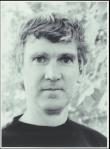David Williamson was brought up in Bentleigh, Melbourne, until the family moved to Bairnsdale, Victoria in 1954. He was educated at the Bairnsdale high school but moved to Melbourne for his last year. Apart from his enthusiasm for drama and literature, Williamson was also good at mathematics and physics, and he completed a mechanical engineering degree at Monash University in 1964.
Dissatisfied with his course of study, Williamson wrote satirical sketches for student reviews and the Emerald Hill Theatre. In 1964 he spent a year working at General Motors Holden but had little interest in car design. He continued to write after becoming a lecturer in mechanical engineering at Swinburne Institute of Technology in 1966 and studied part-time for a postgraduate degree in social psychology at the University of Melbourne. An active opponent of the Vietnam War, he became the inaugural president of the Youth Campaign Against Conscription.
Williamson saw his first play performed in 1968 when the Tin Pan Alley Players produced 'The Indecent Exposure of Anthony East', an unpublished play satirising corporatism. His first full-length play, The Coming of Stork, was performed in 1970 and adapted to film the following year. This process would be repeated for a number of Williamson's plays. By this time Williamson was lecturing in engineering and his new discipline, social psychology. In 1972 he resigned these lectureships to pursue writing full-time after the critical and commercial success of his plays Don's Party and The Removalists. More than twenty plays have followed this success, bringing Williamson numerous awards and exposure overseas.
Overseas productions frequently took Williamson to the United Kingdom and the United States. In 1978 he was Visiting Professor of Drama at the University of Aarhus, Denmark, for a semester. On his return Williamson moved to inner Sydney, which provided a more congenial climate and access to the centre of broadcasting, theatre and film activity. He became increasingly involved in a parallel career of writing screenplays for film and television that brought him international recognition.
Following a falling out with the Sydney Theatre Company Williamson promised his next play, After the Ball (1997) to the Queensland Theatre Company under Robyn Nevin. Williamson had spent increasing periods on the Sunshine Coast in Queensland during the 1990s and by 1997 had relocated to Noosa while retaining an apartment in Sydney.
In June 2005, after being diagnosed with atrial fibrillation, Williamson announced his retirement from writing for the theatre. However, an adaptation of Geoffrey Robertson's 'The Tyrannicide Brief' had a reading by the Sydney Theatre Company on 7 April 2006, and his play 'Strings under My Fingers' was premiered at the Noosa Longweekend arts festival in mid-June 2006. With treatment restoring his health, Williamson returned to writing plays and in June 2008 a new romantic comedy, 'Scarlett O'Hara at the Crimson Parrot', was produced by the Melbourne Theatre Company.
Williamson's plays explore the interactions within social groups such as academic departments, clubs or parties. The collision of temperaments within these groups produce dramatic situations which Williamson uses to satirize the emotional and moral frailty of Australia's educated middle-class. Despite severe criticism for this narrow cultural focus during the 1980s, Williamson has continued to write plays that filled theatres, exposing his audiences to the good and evil of human nature in an unapologetic Australian setting. Williamson wrote twenty-two produced scripts for film and television between 1974 and 1995.
Williamson received Honorary Doctorates of Literature from the University of Sydney (1988), Monash University (1990), Swinburne University of Technology (1996) and the University of Queensland (2004). His plays and screenplays have won many awards.
(Source: Adapted from Brian Kiernan 'David Williamson (24 February 1942- ), Australian Writers, 1950-1975, Dictionary of Literary Biography. Volume 289. Ed. Selina Samuels (2004): 325-334)).
 5205929471247947355.jpg
5205929471247947355.jpg